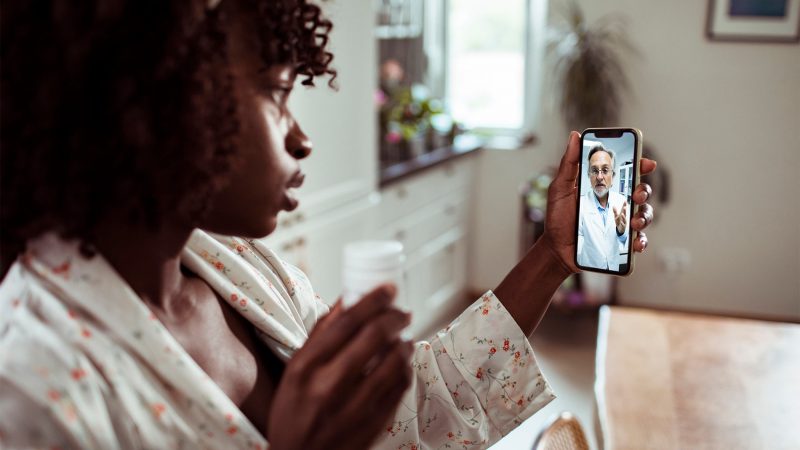- The global healthcare market is in the midst of a significant transformation as major tech innovations drive the demand for digital health
- The likes of Amazon, Apple, and AstraZeneca have noticed the potential of the telehealth market
- Grand View predicts the U.S. telehealth market alone will be worth just shy of US$3 billion (around A$3.9 billion) by the end of 2022
- Advanced Human Imaging (AHI) has developed its unique mobile phone-based body imaging technology and offers BodyScan, FaceScan, and DermaScan imaging capabilities, but has plans to create an all-encompassing medical imaging solution
- Advanced Human Imaging presents a unique opportunity for investors to take part in the upcoming healthcare revolution
The global healthcare market is in the midst of a significant transformation as major tech innovations drive the demand for digital health.
From doctors’ appointments to pill prescriptions to at-home diagnostic kits, consumers are increasingly able to access high-quality healthcare from the comfort of their own home.
And this trend has only been magnified by the COVID-19 pandemic. With government stay-at-home mandates and calls to self-isolate shaping the past year, the need for non-contact healthcare has grown.
After noticing the potential of this lucrative market, ASX-listed Advanced Human Imaging (AHI) has been tackling the digital health sector with its unique mobile phone-based personalised diagnostic imaging technology.
With its proven tech platform, strong management team and upcoming NASDAQ listing, the company has laid the foundations to become a textbook tech success story on the Australian market.
Yet, AHI is not alone in its journey to transform digital health; some of the biggest players in the world of tech have noticed the potential of the telehealth market and began to develop their own technology to grab their share.
The telehealth explosion
Telehealth has become a commodity. While this type of healthcare is crucial when considering lockdowns and self-isolation requirements, the fact of the matter is that telehealth brings the healthcare market up to speed with how consumers interact with the world around them.
It’s for this reason Amazon launched its Amazon Care telehealth service in 2019, followed by Amazon Pharmacy in late-2020.
These services offer 24/7 health services at the click of a button; consumers can book online doctors’ appointments at any time and complete the entire consultation via text, images and video calls.
This means no more waiting rooms and travel times. Further, prescriptions can be delivered to your door if required, and if in-person consultation is crucial, a doctor can be sent to your home.
And it’s not just Amazon. Apple CEO Tim Cook flagged in January 2019 that the tech giant’s future lies in the healthcare market.
“If you zoomed out into the future, and you look back, and you ask the question, ‘What was Apple’s greatest contribution to mankind?’ it will be about health,” Tim told Mad Money’s Jim Cramer.
This statement has become something of a mantra for the Apple boss, with Tim Cook repeating the phrase — almost word for word — several times since then.
He says he believes big tech will play a role in driving down healthcare costs through digital consultations and simple, quick disease detection and prevention. Healthcare will be Apple’s greatest legacy.
Even biotech giant AstraZeneca, which is playing a critical role in COVID-19 vaccine development, is turning to the digital health market. The company has flagged in 2021 that it believes digital tools will become the new standard of healthcare alongside drug prescriptions.
AstraZeneca is moving forward with plans to eventually prescribe two products for patients with chronic conditions: a drug to treat the disease and a digital kit to tell clinicians whether the drug is taken as prescribed and provide other crucial insights typically only available if a patient is monitored in a hospital.
Market researcher Grand View predicts the U.S. telehealth market alone will be worth just shy of US$3 billion (around A$3.9 billion) by the end of 2022.
Further, Issuu expects the virtual diagnostic segment of the telehealth market to hit US$1.5 billion (around A$2 billion) by 2027.
And this is the market Advanced Human Imaging is targeting as it joins the ranks of tech businesses committing to the future of digital health.
All-encompassing medical imaging
Advanced Human Imaging offers unique and accurate body measurements at the click of a button.
Through nothing more than a mobile phone, users can measure the human form across 12,000 data points to analyse key vital markers with an accuracy usually only available in a clinic.
As it stands, AHI offers three types of human body scanning capabilities. BodyScan images body circumference and composition to read biometric markers associated with conditions like cardiovascular disease, obesity, and Type 2 diabetes.
FaceScan is able to detect subtle skin colour changes through blood flow in the face which can indicate blood pressure, cardiac load, heart rate, respiratory rate, risk of stroke and more.
Finally, DermaScan can detect skin diseases and markers associated with over 580 skin conditions in 133 different categories. DermaScan has over 160,000 users and has been used over 500,000 times, with 12 per cent of its userbase being clinicians.
Yet, while there are a handful of competitors tackling specific aspects of handheld imaging, the spoils will go to the company that combines it all.
This is why AHI has a clear vision and strategy to create an accessible all-encompassing medical solution to make the lives of doctors and patients easier.
The company is working towards expanding its digital imaging offering to include multiple clinic-based diagnostics to complete is offering.
AHI has clear plans for its full handheld imaging suite, but there is one other clear advantage that sets the business apart from competitors: the mobile phone.

The AHI difference
Other tech specialists across the globe have emerged offering revolutionary digital health equipment.
Take, for example, a recent partnership between New York-based healthcare specialist TytoCare and Florida’s Tampa General Hospital to create an at-home medical kit for virtual medical exams.
While this tech is certainly ground-breaking, it requires consumers to purchase a full at-home telehealth kit, which patients and clinicians will need to spend time learning how to use properly. The focus of this kit will be to provide medical exams of lungs, heart, throat, skin, heart rate, body temperature and more.
AHI, on the other hand, is leveraging technology that already exists to provide the same degree of expert medical analysis. The company’s platform requires users to simply download an app onto the mobile phone already in their pocket.
Alternatively, Advanced Human Imaging can partner with these global tech giants and provide AHI’s services to their customer base. The business makes data and real-time personal care accessible and affordable to these tech company’s consumers by rapidly and accurately delivering information that would normally require additional equipment or human intervention.
AHI has built up a scalable body imaging platform that can be embedded into partner apps and existing technology. By doing this, the company has set itself apart from competitors for its ease-of-use and accurate imaging capabilities.
Moreover, as global tech giants power ahead with a renewed focus on the telehealth industry, Advanced Human Imaging presents a unique opportunity for investors to take part in the upcoming healthcare revolution.
With such great strides being made in this industry so quickly, investors will need to act soon to seize their opportunity.








